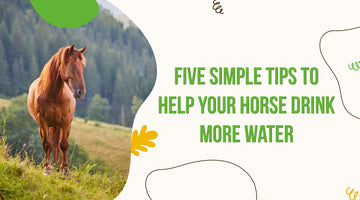
For horse owners, few things are as concerning as a horse that refuses to drink. The age-old adage, "you can lead a horse to water, but you can't make it drink," epitomizes the helplessness one may feel in such a situation. Horses are creatures of habit, and any deviation from their routine can disrupt their drinking patterns. Factors like weather changes, increased workload, or a different environment can all contribute to decreased water intake.
However, there's hope. Despite the challenges, there are numerous cost-effective and practical methods to encourage your horse to drink more water. Simple adjustments to their environment, such as ensuring access to fresh, clean water at all times and adding electrolytes to their feed, can make a significant difference. Additionally, monitoring their water intake closely and providing variety in their water sources, such as offering water from different containers or adding flavorings like apple juice, can pique their interest and encourage them to drink more.
By understanding your horse's needs and experimenting with different strategies, you can help ensure they stay hydrated and healthy, even in challenging circumstances. Ultimately, with patience and persistence, you can overcome the hurdle of a horse that won't drink and promote their well-being.
1. Make sure there are always two water options available.
Let's be honest—horses can be quite particular. When you think about it, they naturally prefer drinking from larger bodies of water like streams and ponds. Many horses hesitate to drink from small, confined containers. Depending on how your horse is housed, providing two water sources can ease your worries as an owner. This ensures that if one option doesn't suit your horse's preferences, they have another to choose from. Having two sources of water available gives you peace of mind, knowing your horse always has access to hydration, regardless of their pickiness.
2. Change the water containers regularly.
Not many horse owners consider how the choice of water container can affect their horse's water intake. Some horses may prefer drinking from larger troughs, while others may prefer buckets. The material of the container also plays a significant role; rubber troughs are prone to bacterial buildup and debris accumulation, unlike plastic buckets, which are easier to clean. Understanding your horse's preference is essential for encouraging them to drink more water.
3. Add salt to your horse's meals to encourage them to drink more water.
Just like humans, horses need a certain amount of sodium in their diet. An easy way to ensure your horse gets enough sodium is by adding 1-2 teaspoons of salt to their feed once or twice a day. This method not only helps you control the amount of sodium your horse consumes but also allows you to observe how your horse reacts, so you can make adjustments as needed.
Another method to boost your horse's sodium intake is by providing them with access to a salt lick. However, many commercial salt licks and mineral blocks are heavily processed and may contain bitter additives. To avoid this, choose a natural mineral lick such as Himalayan salt or Redmond Rock. These options offer better bioavailability and a palatable taste for your horse.
4. Give some thought to adding flavor to your horse's water.
Occasionally, horses may reduce their water intake due to the taste or odor of the water. Environmental changes and travel are often the main reasons for this. However, adding flavor to your horse's water can encourage them to drink more. For example, incorporating a small amount of apple cider vinegar or molasses has proven effective for some horses. Additionally, there are various commercially available water additives in different flavors, some of which contain electrolytes, providing extra benefits. If you're uncertain about what's suitable and safe for your horse, it's best to seek advice from a veterinarian beforehand.
5. Consider using electrolytes for your horse.
There's a widespread misunderstanding that salt and electrolytes are identical. Salt contains two electrolytes: sodium and chloride. However, electrolyte supplements typically contain a broader range of essential minerals, such as potassium, magnesium, calcium, and phosphorus, in addition to sodium and chloride. By incorporating both salt and electrolytes into your horse's diet, you can ensure they receive all the necessary minerals while also boosting their water intake.
With numerous electrolyte supplements available, it's crucial to conduct thorough research. Selecting an electrolyte that offers highly absorbable minerals with minimal additives is essential. Follow the instructions carefully to ensure your horse receives the recommended dosage, and be prepared to adjust it as necessary, particularly during changes in weather and environment.
Conclusion:
Understanding the unique preferences and needs of your horse is key to promoting consistent water intake. Whether it's through adding electrolytes to their diet or offering flavored water alternatives, there are various methods to entice your horse to drink more water.
Remember, dehydration in horses can lead to serious health complications, so it's crucial to monitor their water intake closely and seek veterinary attention if you notice any signs of dehydration. By prioritizing hydration and incorporating these tips into your horse care routine, you can help ensure your equine companion remains happy, healthy, and hydrated for years to come.
For more information on horse care and wellness products, visit our website at camelinagold.com.
F&Qs
How can I hydrate my horse fast?
When they start showing signs of exhaustion or dehydration, you can give them electrolyte pastes and other water additives such as “horse quencher.” In severe conditions the fastest way to hydrate the horse is through the vet administering IV fluid.
Why a horse won't drink water?
Horses usually drink as much as they need, although in cold weather (and sometimes when stressed or traveling) they tend to drink less. Some problems that cause horses to drink less water are serious. Sometimes, exhausted, dehydrated, or otherwise very sick horses will not drink water despite their need for it.
What are 3 symptoms of dehydration in horses?
Dehydrated horses can become confused, tired, and lose the ability to focus. Additionally, a dehydrated horse might not seem thirsty because it might stop drinking or refuse to drink water. If you notice any of these symptoms in your horse, especially when working in hot weather, seek veterinary attention right away.




